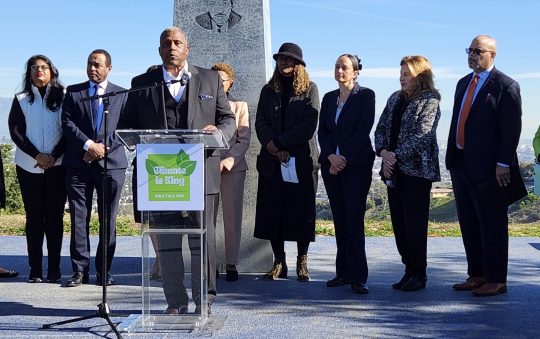
The Los Angeles Metro has been in the making for a long time. On January 29, 1993, former Los Angeles Mayor Tom Bradley stood among a swarm of public officials and transit agency staffers on the cramped Pershing Square subway platform. Bradley proudly inaugurated the opening of the first modern subway in Los Angeles.
Fast forward to 2017, Mayor Eric Garcetti, U.S. Transportation Secretary Anthony Foxx, FTA Acting Administrator Carolyn Flowers, Los Angeles, LACMTA Board Chair John Fasana, LACMTA Board Director and L.A. County Supervisor Sheila Kuehl, LACMTA CEO Phil Washington and Metro Board Member Jacquelyn Dupont-Walker celebrated continued growth and proudly inaugurated the Los Angeles Westside Purple Line Extension.
Mayor Garcetti reminded the audience of Bradley’s goal and his pride of seeing the vision coming to pass. He also made note “the Los Angeles Metro System would be completed with hopeful thinking just in time to host the 2024 Olympics,” with cheers and smiles from the audience as Los Angles has a bid to host 2024 Olympics.
Los Angeles has grown to be known as the car capital of the nation. Angelenos spend an average of 81 hours a year stuck in traffic. Currently, there are 10.2 million people living in L.A. County, and that number is projected to increase by 2.3 million people in the next 40 years. Traffic congestion and air pollution are expected to get worse with more growth. Traffic is stressful with a lack of comprehensive subways and Metro to relieve the stress; like other highly populated cities Chicago, New York, Washington and the California Bay area. The Metro vision has become more than a vision of hope but a strong necessity for the city of Angels. The efforts to provide a more efficient, less congested Los Angles Transportation system is supported on all levels of California government.
“Good transit systems work well when they are inclusive,” said Congresswoman Karen Bass.

“This $1.5 billion federal investment into communities across L.A. County serves as a great example of our city’s commitment to creating a system that will increase the interconnectedness of our citizens. The Purple Line extension will ease traffic from downtown to the west side, and will help improve transit access to educational centers, jobs, and other opportunities in West Los Angeles, all while making our city more attractive in our bid to host the 2024 Olympic games. I thank Mayor Garcetti, and Secretary Foxx for getting this project closer to the finish line, and look forward to the third phase of the plan that will bring the Purple Line to the Veteran’s Administration Hospital.”
The 1.6 billion includes grant funds and a loan agreement toward the Westside Purple Line Extension Section 2 Project, continuing vital federal support for expanding subway service farther west in one of the Los Angeles area’s busiest corridors. The 2.6-mile extension through the cities of Beverly Hills and Century City will greatly improve transit access to jobs, educational centers, and other opportunities in West Los Angeles and throughout the region.
Transportation Secretary Anthony Foxx said that he hopes the incoming Trump administration will continue to push for improvements to the Metro system. President-elect Donald Trump has chosen Elaine Chao, the former labor secretary and wife of Senate Majority Leader Mitch McConnell, to be his choice for transportation secretary.
“I believe we are at a crossroads with our nation’s transportation system,” he said.
“We are a different country than we were when the department [of transportation] opened its doors 50 years ago — more diverse, urban and populated,” he wrote. “I wish the next Secretary of Transportation every success, and hope the work we did in this administration will help empower the next administration to build and even stronger transportation system that serves the American public.”
The majority of Los Angeles Metro funding is provided from the Proposition A, C Measure R and M local sales taxes. The Proposition A sales tax, approved by voters in 1980, is a one-half of 1% tax on most retail sales in the County. The Proposition C sales tax, approved by voters in 1990, is an additional one-half of 1% tax on retail sales in the County. Measure R was approved by 2/3 of the Los Angeles County voters in the November 2008 election. Measure R is an ordinance authorizing an additional ½ of 1% sales tax to fund traffic relief and rail expansion according to an expenditure plan contained in the ordinance. The Measure R sales tax became effective July 1, 2009 and will remain in effect for 30 years. Measure M approved in November 2016 by 69.82% of voters is a permanent sales tax increase to fund a major expansion of the county’s public transit system. For more information about LA Metro plans visit www.theplan.metro.net.






